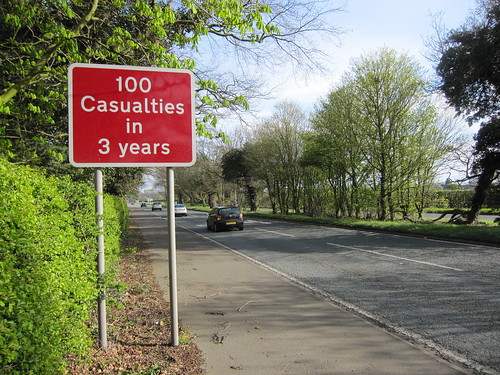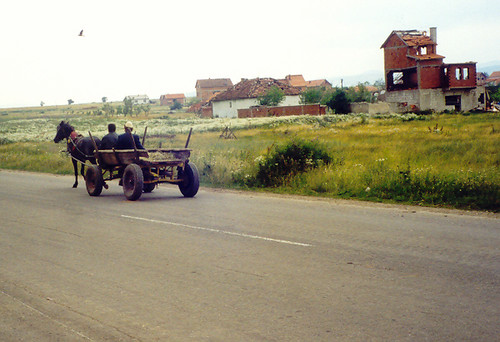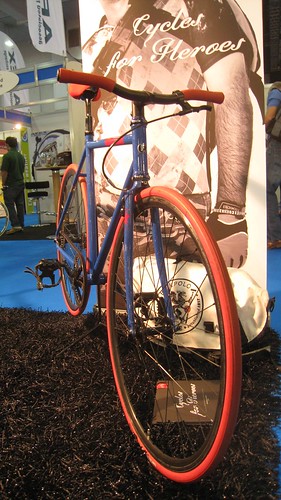There were, I have to admit,
a lot of ideas that shocked me half a life-time ago at university. But one of my more wasted fits of the vapours was over a psychology lecture I attended about
Noam Chomsky’s ideas on grammar. It made no sense, according to Chomsky's theories, to imagine languages followed hidebound rules on whether infinitives could be split or what the accusative
of the interrogative pronoun “who” was. Languages instead
followed “derived grammars” – a set of principles that could be divined by
working out how the language’s speakers actually used it.
“Whom does he think he is
kidding?” my pedantic late-teenage self asked. “Who is he boldly to go into the
question like this?”
Yet,
however schocking I found the great Chomsky’s views, his ideas have been coming
back to me lately. In this blog, I’ve written a lot about how people should
think about cycling and other ways of using the roads. I’ve been looking at how
best to enforce de jure, written-down rules. For this blog, I'm changing perspective, looking around and trying to divine what Chomsky might call the “derived principles of
road use”. Forget what the rules say. How do people actually use the roads?
The principles I've deduced seem to me to do a far better job than any other explanation I've seen of dealing with some otherwise inexplicable phenomena I encounter on the roads.
The first of my Great Derived Principles of road use, for example, explains a mystery that's bothered me for some time. Why, I've often wondered as I watch some driver slalom around the road while using their telephone, are so many people willing to risk others' lives for the sake of a possibly entirely trival 'phone conversation?
The first of my Great Derived Principles of road use, for example, explains a mystery that's bothered me for some time. Why, I've often wondered as I watch some driver slalom around the road while using their telephone, are so many people willing to risk others' lives for the sake of a possibly entirely trival 'phone conversation?
 |
| A chilling warning - but only to motorists who understand everyone else is real too |
It’s going to be difficult, I
recognise, for some readers to accept this theory since it's coming from me and I, at the end of the day,
amn’t you. Some of you might have drawn different conclusions from my
confrontation a few weeks ago with the Angry Man of Clapham Road. It's entirely possible, I suppose, that the AMCR, who
took badly to being told not to drive into an area reserved for cyclists, fully understood his fellow road-users’ humanity. He might simply have
thought it reasonable to express his irritation by pulling his car, as I saw him do, across a cyclist’s path. Maybe he’d thought fully about the lives he would wreck if he seriously injured the man and still thought it worth making his point.
But ask yourself, I urge you,
this question: when did you last see someone else using the road who struck you
as as wise, sophisticated and intelligent a road user as yourself? When, by
contrast, did you last ask yourself, “What’s this idiot up to?” or mentally or audibly
shout some term of dismissive abuse at another person on the roads? If you’ve noted, say, half as many wise people as idiots, I grant that you have
your arms round the idea that other people are as real as you. For anyone else,
I fear you don’t. It is only natural, as far as you're concerned, to treat others' fears, concerns and complaints on the roads with both contempt and incomprehension. Which would be a problem only if everyone else also felt like
the world’s only real person and were using the roads on the same basis that
only he or she really mattered.
Many of you may
still, nevertheless, feel protected by another phenomenon I’ve spotted. Just as Billy Bragg
once sang, “Sexuality, your laws do not apply to me,” many of my fellow road
users seem to be humming something similar about old-fashioned Newtonian
physics (“Physics, I can see/ Your principles don’t work for me,” perhaps?).
It’s a tendency I first
observed when catching taxis around the cities of the Balkans a decade ago.
From Skopje to Sarajevo ,
Bucharest to Belgrade Skopje ’s or Sarajevo ’s
or Bucharest ’s or Belgrade
 |
| A typically bucolic scene in post-war Kosovo: special physics is keeping the farmers on the wagon. |
Those special powers, I came
to realise, had been magically granted to many of the other drivers on the
roads as well. Early post-war Kosovo seemed to me to present an unusually wide
array of ways to crash. Kosovo Liberation Army foot patrols were apt to spring
suddenly from the roadside into one’s path, giving a simple “how-not-to” class
in running a vehicle checkpoint. Roads were apt to run out abruptly where a bridge
had been bombed. Some were simply very, very heavily bomb-cratered. But, when I
looked around, I noticed that pretty much everyone who wasn’t me or driving a
tank was seatbelt-free, protected by the magic of their special driving.
The principle applies beyond
the Balkans. Philip Hammond, the past UK
Among cyclists, the
“suspension of physics” crowd have their adherents among what I call the
“chicken licken” cyclists – those I see cycling around wearing helmets with the
chinstraps undone. According to conventional physical principles, unattached helmets offer
excellent protection against the risk that the sky will fall. But, in any
actual, foreseeable crash, they would fly off, offering protection barely beyond the “lucky charm” level – “I’ll be safe because I’ve made a
gesture in the direction of being so”.
However, perhaps the surest
proof that some people think physics has been suspended is the persistence both
of in-line skating and the behaviour I encountered one afternoon on the Serpentine Road London ’s Hyde Park . The
road is generally a stressful place to ride because of its popularity as a
place for skaters to grapple with the fundamental problems of their means of
transport. Some lay out little obstacle courses; others practise skating
backwards. All fail to realise a means of transport where braking
automatically overbalances you doesn’t work.
This man, however, went a
step further. After a brief argument over how his sticking a skate into my path
had forced me to swerve, he started
shoving me. Given that the slightest return push would have sent him sprawling
to the ground, he either saw himself as above physics or saw the Invisible Visible
Man as a liberal wuss who would never dare shove back. The second idea is,
obviously, one we can safely discard. He thought physics was only for the little people.
Yet, for anyone who doesn’t
find it preposterously prattish, perhaps the appeal of in-line skating lies in
the Third Great Derived Principle of Road Use: that form is more important than
function, that it’s more important to be cool than safe.
 |
| A fixie at the Bike Show: this one seems designed for looks rather than function |
One of the great exemplars of
this phenomenon is the recent popularity of certain kinds of fixed-wheel bikes
for road use. Many of these bikes lack brakes (albeit it’s possible to slow
down by pushing backwards on the pedals). All lack gears to match the
cadence of the rider’s pedalling to the bike’s current speed, the road gradient
and any number of other factors.
There are, granted, circumstances where such bikes’ simplicity is an advantage (track racing, bicycle polo and, well, track racing and cycle polo). But it’s hard to escape the conclusion that they’re popular mainly because their clean, classic lines look cool. People are prepared, as a result, to put on their knees the strain that gears would otherwise handle.
There are, granted, circumstances where such bikes’ simplicity is an advantage (track racing, bicycle polo and, well, track racing and cycle polo). But it’s hard to escape the conclusion that they’re popular mainly because their clean, classic lines look cool. People are prepared, as a result, to put on their knees the strain that gears would otherwise handle.
 |
| An SUV with tinted windows: not obviously sensible. |
Drivers have been
following the "cool matters most" principle pretty much ever since Chrysler first stole a march on
Ford by coming out with a new model range every year. In south London
But it’s not just in their
kit that people show their desire to be cool. A pedestrian I encountered last
week in Waterloo
“Caaaalm dowwwn,” he said,
slowly and patronisingly when I suggested laughing at me might not have been
the most appropriate response to a mildly sarcastic reprimand.
Perhaps, however, that sums
up the conflict. I’ve spent years puzzling out the most rational way of getting
people to relate to each other on the roads. The vast bulk of road-users regard
my efforts with the same puzzlement as my efforts to keep the pronoun “whom”
alive or infinitives together.
With the grammar, I’ve long
since giving up on persuading others to agree. The encounter with the AMCR has
reduced my enthusiasm for making the point on the roads. It ended with his threatening,
fists raised, to assault me and my desperately calling the police. Call me a
coward if you will – I can’t quite face a beating over this gulf of
understanding.
MIT Grad? First time I have seen someone apply Noam Chomsky to cycling. Interesting essay!
ReplyDeleteKhal,
DeleteThanks for your comment.
I'm afraid I'm not clever enough to have gone to MIT, so the lectures weren't from Chomsky himself.
As I mentioned in a previous post (http://invisiblevisibleman.blogspot.co.uk/2012/03/it-may-be-fun-but-is-cycling-part-of.html) I attended St Andrews University. It's sadly now famous mainly as the place where Prince William and Kate Middleton met. But it did provide some real education, as well as being a refuge for posh people too stupid to go to Oxford or Cambridge,
Invisible.
Unusually meaty post. Two items in your analysis that apply differently in North Texas: Helmets provide good protection against hail even if unbuckled, and multiple gears are somewhat redundant here. Brakes are NOT redundant so your fixed gear observations are otherwise on target, proving once again that my superiorness only reads superior blogs. And this post merits some serious pondering...
ReplyDeleteSteve,
DeleteThank you for your message - and your various kind words.
I was expecting to get some feedback from fixed-wheel and single-speed riders. So it's worth saying I exaggerated my views on the point for effect (this, you'll recognise, is not a first offence). Single speed makes more sense where it's flat. But don't you struggle with the wind sometimes?
I hadn't thought about the hail and unbuckled helmets point, I admit. But we seem to agree unbuckled helmets mainly offer protection against objects falling from the sky. Buckled up, they offer protection against a range of other things (not that I'm seeking to overplay the risks).
All the best,
Invisible.
To the question of wind, the answer is: S3X...
Delete